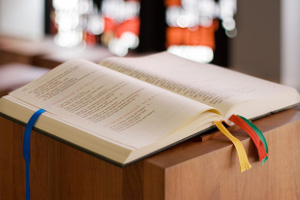 Why would you want to plant a mulberry tree in the sea?
Why would you want to plant a mulberry tree in the sea?
In Matthew (17:20; 21:21) and Mark (11:23) it is not a tree but a mountain that is moved or thrown in the sea. This I understand. There are lots of mountains in my life that need moving. But are there also trees that need uprooting and replanting in the sea? Does the illustration invite us to picture the sea (image of chaos and the abyss) as grounding for a tree? The mulberry tree has medicinal properties. In faith, healing can be rooted in chaos.
Why would disciples say: “we are worthless slaves”? Achreios (worthless) is the Greek word for behaviour that “lacks usefulness”. It is in Greek used derogatory for slaves who do not work well. In the context of this parable it sounds exceedingly harsh: Jesus compares discipleship with severe slave labour. I wonder whether underneath the alienation that these images of Jesus provoke there is a deep comfort. The Kingdom of God might seem utterly strange (mulberry tree in sea) and impossible to attain (tough slave labour) but if we just do as we are told by God and act in faith the Kingdom of God naturally flourishes, so unobtrusive that we might be surprised: surprised by healing flowing from chaos and service coming from the master.
2 October 2016
Luke 17:5-10
This weekly blog on one of the lectionary readings is by Anne Claar Thomasson-Rosingh, Programme Leader for Lifelong Learning at Sarum College.

Leave a Reply